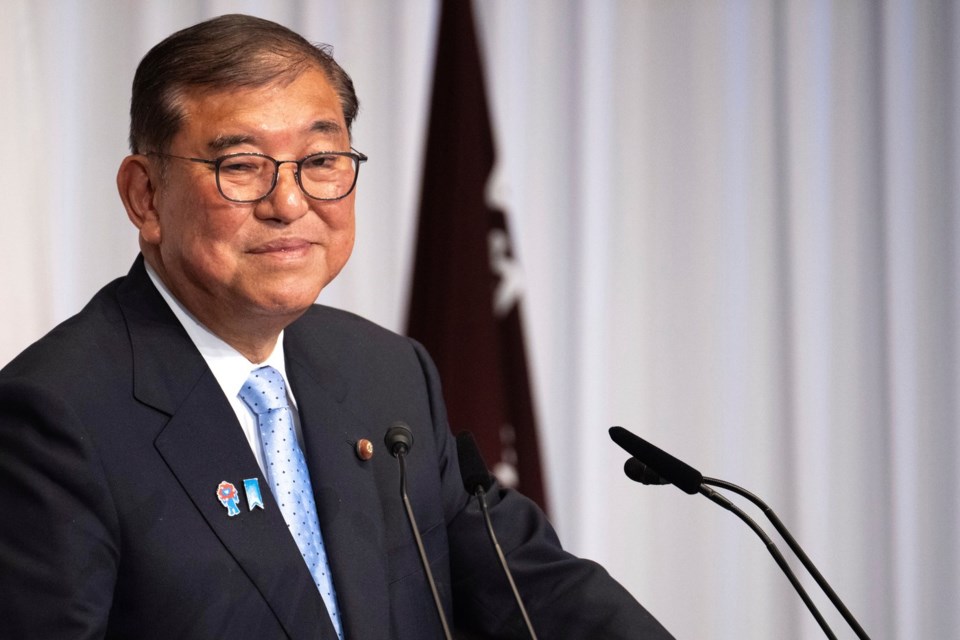TOKYO (AP) — Japanese Prime Minister Shigeru Ishiba said Monday he will stay in office to tackle challenges such as rising prices and high U.S. tariffs after a weekend election defeat left his coalition with a minority in both parliamentary chambers and triggered calls for his resignation.
Ishiba’s ruling Liberal Democratic Party and its junior coalition partner Komeito were short three seats to maintain a majority in the 248-seat upper house in Sunday’s vote. The coalition is now a minority in both houses of the Diet, or parliament, though the LDP is still the leading party.
Ishiba said he takes the result seriously but that his priority is to avoid creating a political vacuum and to tackle impending challenges, including the Aug. 1 deadline for a tariff deal with the U.S.
“While I painfully feel my serious responsibility over the election results, I believe I must also fulfill my responsibility I bear for the country and the people so as not to cause politics to stall or go adrift,” Ishiba said. “Challenges such as global situation and natural disaster won't wait for a better political situation."
His chief tariff negotiator, Economic Minister Ryosei Akazawa, is heading to Washington for his eighth round of talks. The prime minister hopes to reach a mutually beneficial deal and meet with U.S. President Donald Trump “as soon as possible," he said.
Sunday’s vote comes after Ishiba’s coalition lost a majority in the October lower house election, stung by past corruption scandals, and his unpopular government has since been forced into making concessions to the opposition to get legislation through parliament. It has been unable to quickly deliver effective measures to mitigate rising prices, including Japan’s traditional staple of rice, and dwindling wages.
Trump has added to the pressure, complaining about a lack of progress in trade negotiations and the lack of sales of U.S. autos and American-grown rice to Japan despite a shortfall in domestic stocks of the grain. A 25% tariff due to take effect Aug. 1 has been another blow for Ishiba.
At a news conference Monday, Ishiba said his LDP and the Komeito have agreed to stick with their coalition while seeking further cooperation from opposition parties.
Ishiba resisted calls for his resignation and did not say how much longer he planned to stay on. He is sticking around for the country and the people, not for self-interest, “to put the pressing issues on a path to a solution," he said.
Voters frustrated with price increases exceeding the pace of wage hikes rapidly turned to emerging conservative and right-wing populist parties.
The Democratic Party for the People quadrupled its seats by campaigning for higher take-home pay. The right-wing Sanseito, running on a “Japanese First” platform that includes stricter regulations on foreigners and traditional gender roles, surged to number three in the opposition.
The LDP has lost support due to the people's discontent over the party's measures for rising prices, foreign residents and other reasons and that he will “quickly analyze the results and learn the lesson," Ishiba said.
None of the opposition parties said they were open to cooperating with the governing coalition. CDPJ leader Yoshihiko Noda told broadcaster NHK that his priority is to form an alliance among the opposition.
“Public opinion clearly said ‘no’ to the Ishiba government,” Noda said.
Sanseito leader Sohei Kamiya told NHK late Sunday he is open to cooperating with the ruling bloc on conservative policies. While he said his party did better than expected, he would wait to gain more seats in the other house in the next election and attempt to form a multi-party coalition like in Europe.
Mari Yamaguchi, The Associated Press



